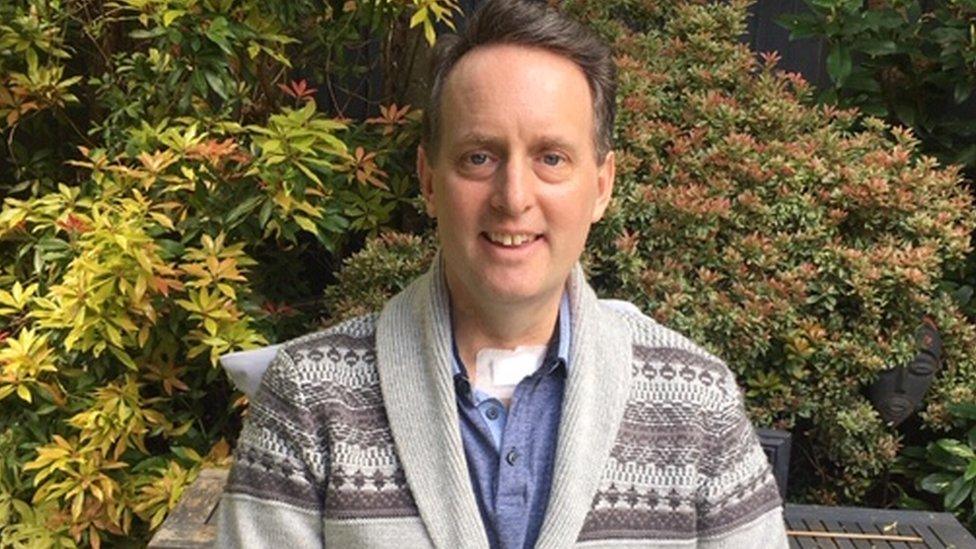Coronavirus: Royal Gwent ICU 'like a scene from science fiction'
- Published
David Hepburn says everyone who worked in hospitals during the pandemic will be changed by the experience
David Hepburn was one of the first NHS doctors to become ill with Covid-19 when he was infected in early March.
But little did he know the intensive care unit he was leading was about to be flooded with critically ill patients as south-east Wales became an early coronavirus hotspot.
At its peak, 49 patients were critically ill on ventilators at the Royal Gwent Hospital's intensive care unit in Newport - the unit's usual maximum capacity being 14.
But on Thursday, there were no Covid-19 patients left in intensive care at both hospitals in the Aneurin Bevan University Health Board area.
In a wide-ranging interview with BBC Wales' health correspondent Owain Clarke, Dr Hepburn reflected on the experiences of the past five months and his hopes and fears for the future.
What are your memories of having the virus?
It's a bit of a blur. My main feeling was frustration because I knew that the intensive care unit was getting a clobbering.
With so many staff off, two of my colleagues essentially ran the intensive care unit for the first two or three weeks, not leaving the hospital. So they really saved the day.
That was an incredibly difficult time and it was very frustrating for those of us who were at home, because we wanted nothing more than to be able to go in and help, and we couldn't.
And when you got back?
We can normally ventilate 14 patients, so we exceeded our capacity by more than three times.
We weren't able to talk to people's families directly.
We have to do all our communication over the telephone, which is very difficult to do with families that you've not met before.
Was there a point where you thought you would not be able to cope?
We got very close. There had been a lot of talk early on in the outbreak of availability of ventilators - we went to get ventilators from every part of the hospital that we could.
The biggest issue for us at one point was we nearly ran out of fluid for the kidney machines, so we had to use them for a short period of time and then swap them over.
Thankfully, there was no direct harm from that but we were really stretching our resources very, very tight.
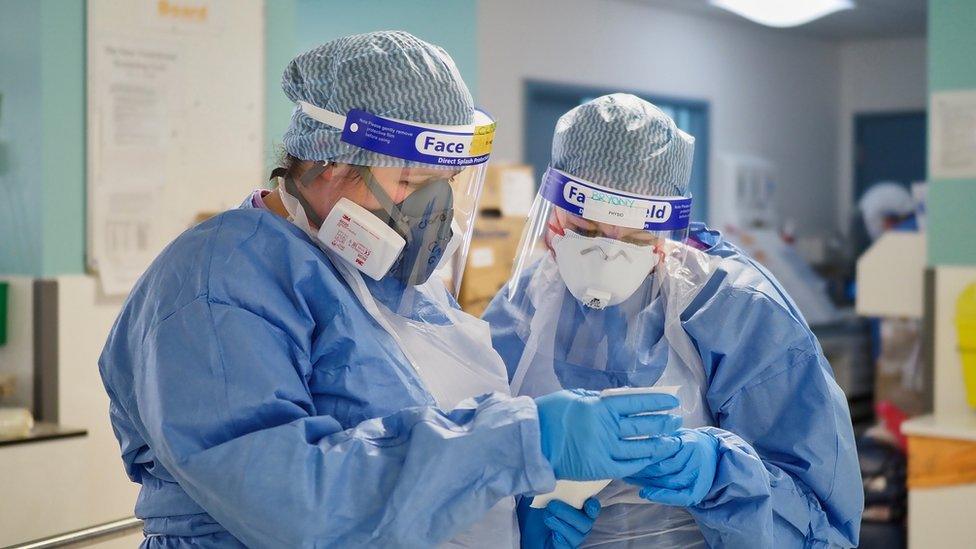
Newport's ICU looked like a scene from a science fiction film, Dr Hepburn says
Two weeks before the pandemic we were hearing reports from Italy and from China and one of the things they'd been forced to do, particularly in Italy, was ration critical care beds.
So if you've got three people coming in desperately unwell and only one bed to put them in, then that's when you're forced to make very, very difficult decisions.
How do you decide if someone's life is more worthy than someone else's?
I'm really happy to say that we never got to that stage.
Were there shifts when you went home and it hit you?
There were a few.
It was the sheer number of people we were dealing with which became very frightening.
I think everyone who dealt with the pandemic, from the medical to the nursing staff to, well, everybody, really will be changed by this experience. For the better or worse, I don't know.
There were definitely a few days during the pandemic that I really couldn't face getting out of bed and coming in - though obviously I did.
I've never felt like that before in my medical career.
The most positive thing was seeing all the different teams and all the different specialties pulling together.
Everybody worked their socks off.
Do you think of yourself and your colleagues as heroes?
I think that this is a job we chose to do as a job, that we trained to do. So, no, I don't think we did anything heroic at all. We did what we do and we did it well.
Everybody working at the ICU has stable jobs. So even though circumstances are very difficult. we're getting our monthly pay-checks.
That's more than a lot of people during this pandemic, and I think keeping your family fed in that situation is heroic.
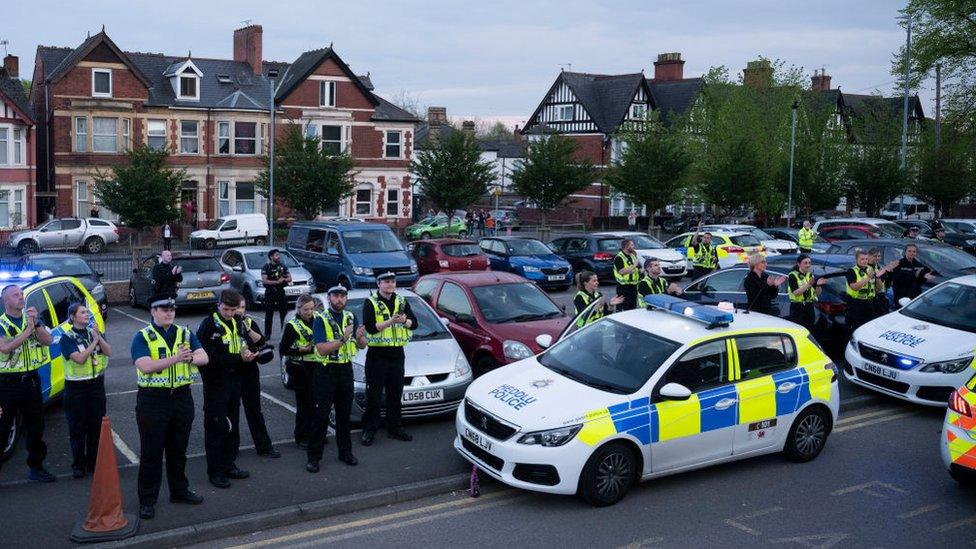
Workers at the Royal Gwent Hospital were applauded during the 10 weeks of clapping
Are you expecting a second peak?
I think it's too early to tell.
But I think we would be very lucky to get away without one.
It's not impossible, but the point is that not that many people in the population have had this yet and there is no effective vaccine.
So there are going to be sporadic outbreaks here and there, and that's why having a working track and trace programme so you can locally shut outbreaks down and find everybody involved and isolate them is really important.
What about the easing of lockdown happening at a different pace across the UK?
I think the Welsh Government have done a really good job in the public health point of view. I think that us taking our own direction as a country, and being a little bit more conservative, has paid off.
Last night, there were no cases of Covid-19 in intensive care in any of the hospitals in the Cwm Taf region, and certainly none in Aneurin Bevan. And there were no deaths for several days running this week.
You compare and contrast that to the number of deaths in England at the minute, which is still obviously a bigger population, but they're still over 100 deaths a day.
The Welsh Government have treated the Welsh population as sensible adults which we are, but they've also been cautious which has paid off.
How are your patients doing now?
Some of them you don't even recognise, because they look fantastic.
You see people unconscious on a ventilator, you're not looking your best. But when they walk into clinic, they're all doing really, really well.
On the psychological side of it, I think for some it will take a long time to get better. And a lot of patients who've been through intensive care have post traumatic stress as a result of delirium.
What would be your lasting memory?
Walking onto the ICU which normally has 12 beds and seeing 26 people in there, all on ventilators.
And everybody wearing PPE.
It was like a scene from a science fiction film.
That really took my breath away - walking into that and just thinking, the size of the job we've got to do here is very, very daunting.
I'm really happy that we did it and we got through it, but I don't particularly want to do it again.
- Published11 May 2020
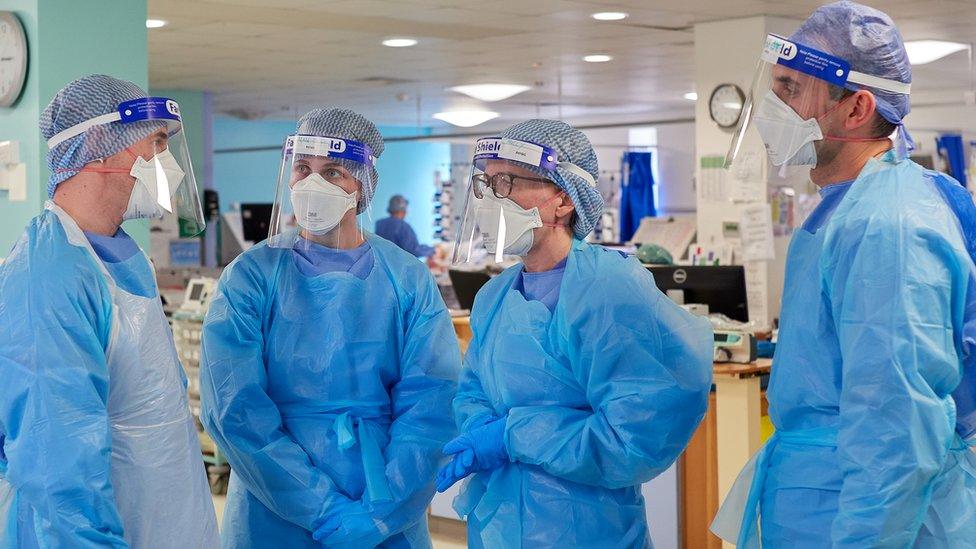
- Published2 July 2020
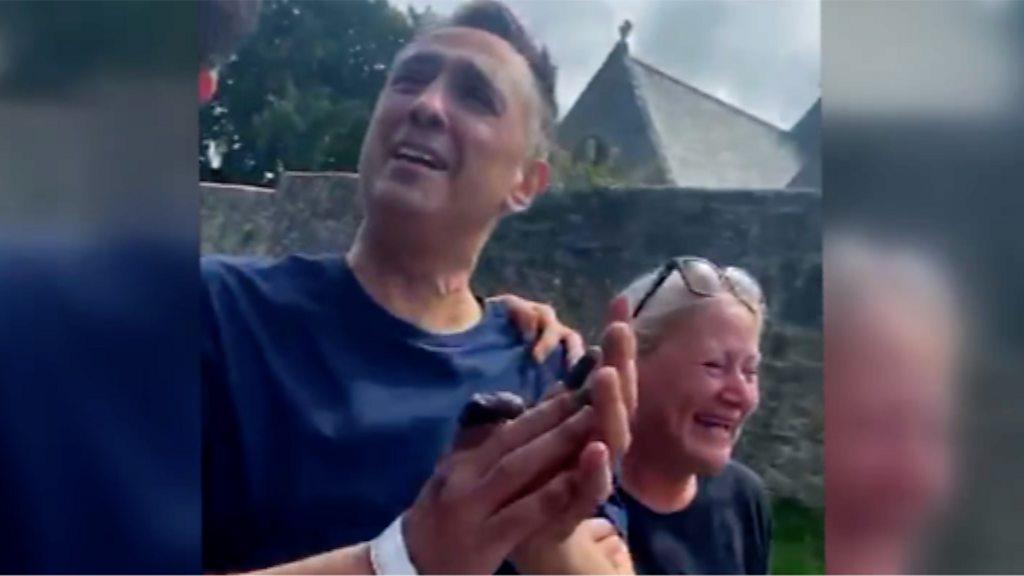
- Published28 May 2024

- Published4 May 2020
